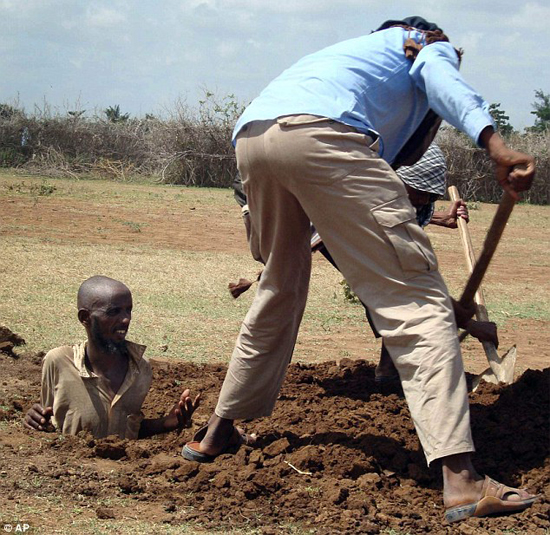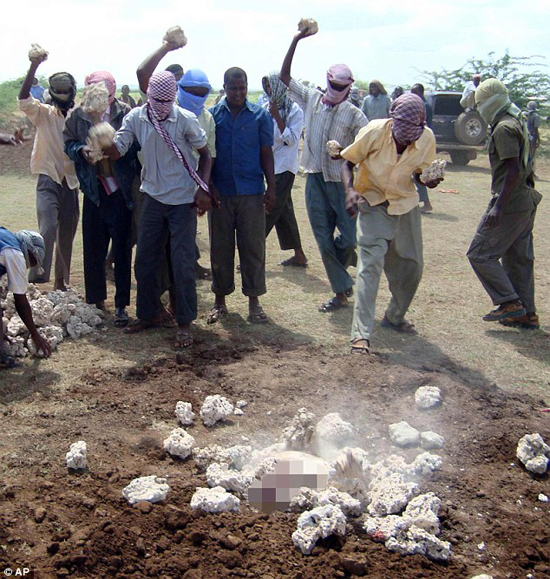|  Health
consequences of FGM (Fact sheet no. 241 Female Genital Mutilation,
World Health Organization, June 2004): "Immediate complications
include severe pain, shock, haemorrhage,
urine retention, ulceration of the genital region and injury to
adjacent tissue. Haemorrhage and infection can cause death.
More recently, concern has arisen about possible transmission of
the human immunodeficiency virus (HIV)
due to the use of one instrument in multiple operations, but this
has not been the subject of detailed research. Long-term consequences
include cysts and abscesses, keloid
scar formation, damage to the urethra resulting in urinary incontinence,
dyspareunia (painful sexual intercourse) and sexual dysfunction
and difficulties with childbirth. Psychosexual
and psychological health: Genital mutilation may leave a lasting
mark on the life and mind of the woman who has undergone it. In
the longer term, women may suffer feelings of incompleteness, anxiety
and depression." Health
consequences of FGM (Fact sheet no. 241 Female Genital Mutilation,
World Health Organization, June 2004): "Immediate complications
include severe pain, shock, haemorrhage,
urine retention, ulceration of the genital region and injury to
adjacent tissue. Haemorrhage and infection can cause death.
More recently, concern has arisen about possible transmission of
the human immunodeficiency virus (HIV)
due to the use of one instrument in multiple operations, but this
has not been the subject of detailed research. Long-term consequences
include cysts and abscesses, keloid
scar formation, damage to the urethra resulting in urinary incontinence,
dyspareunia (painful sexual intercourse) and sexual dysfunction
and difficulties with childbirth. Psychosexual
and psychological health: Genital mutilation may leave a lasting
mark on the life and mind of the woman who has undergone it. In
the longer term, women may suffer feelings of incompleteness, anxiety
and depression."
 Female
Genital Mutilation, Somalia (Amnesty International, Nov 5, 2005):
"Virtually
all Somali women [98%] are genitally mutilated. There is no law
specifically prohibiting FGM." Female
Genital Mutilation, Somalia (Amnesty International, Nov 5, 2005):
"Virtually
all Somali women [98%] are genitally mutilated. There is no law
specifically prohibiting FGM."
 The
World Medical Association Statement on Female Genital Mutilation,
Oct 1993: “The World
Medical Association condemns the practice of genital mutilation
including circumcision where women and girls are concerned and condemns
the participation of physicians in the execution of such practices.” The
World Medical Association Statement on Female Genital Mutilation,
Oct 1993: “The World
Medical Association condemns the practice of genital mutilation
including circumcision where women and girls are concerned and condemns
the participation of physicians in the execution of such practices.”
 Policy
Statement | Female Genital Mutilation (American Academy of Pediatrics,
PEDIATRICS Vol. 102 No. 1 Jul 1998, pp. 153-156): “...
pediatricians and pediatric surgical specialists should be aware
that this practice [FGM] has serious,
life-threatening health risks for children and women. The AAP opposes
all forms of FGM …” [Disturbing
graphical descriptions included] Policy
Statement | Female Genital Mutilation (American Academy of Pediatrics,
PEDIATRICS Vol. 102 No. 1 Jul 1998, pp. 153-156): “...
pediatricians and pediatric surgical specialists should be aware
that this practice [FGM] has serious,
life-threatening health risks for children and women. The AAP opposes
all forms of FGM …” [Disturbing
graphical descriptions included]
 A
Gap in their Hearts: the experience of separated Somali children
(UN Office for the Coordination of Humanitarian Affairs, Sep 21,
2003): "After a decade of international neglect to, Somalia's
unique circumstances ever since the
collapse of the state in 1991 have served to produce one of the
largest groups of separated children arriving in Europe and North
American countries." A
Gap in their Hearts: the experience of separated Somali children
(UN Office for the Coordination of Humanitarian Affairs, Sep 21,
2003): "After a decade of international neglect to, Somalia's
unique circumstances ever since the
collapse of the state in 1991 have served to produce one of the
largest groups of separated children arriving in Europe and North
American countries."
 UN
Commission on Human Rights: Situation of Human Rights in Somalia
(PDF,
226 KB) UN
Commission on Human Rights: Situation of Human Rights in Somalia
(PDF,
226 KB)
 Pirates
seize tanker off Somalia (AlJazeera TV, Qatar, Mar 30, 2006):"Somalia's
lawless Indian Ocean waters are among the world's most dangerous.
Craft plying the waters often are attacked by armed men in heavily
armed speedboats who demand ransom for the return of the ship or
cargo, which often ends up being stolen. The piracy has often stopped
food aid getting into the poor country. Sailors have been held for
as long as 100 days and a cruise ship with more than 300 on board
was attacked with rockets and machine guns last year." Pirates
seize tanker off Somalia (AlJazeera TV, Qatar, Mar 30, 2006):"Somalia's
lawless Indian Ocean waters are among the world's most dangerous.
Craft plying the waters often are attacked by armed men in heavily
armed speedboats who demand ransom for the return of the ship or
cargo, which often ends up being stolen. The piracy has often stopped
food aid getting into the poor country. Sailors have been held for
as long as 100 days and a cruise ship with more than 300 on board
was attacked with rockets and machine guns last year."

Stoning to death
of a Somali "adulterer"  following the "verdict" of an Hizbul
Islam "court". Mohamed Abukar Ibrahim, a 48-year-old,
was buried in a hole up to his chest and pelted with rocks until
his face was a bloody mess and he died. His face has been pixellated
on grounds of taste. - Daily
Mail, Dec 15, 2009
following the "verdict" of an Hizbul
Islam "court". Mohamed Abukar Ibrahim, a 48-year-old,
was buried in a hole up to his chest and pelted with rocks until
his face was a bloody mess and he died. His face has been pixellated
on grounds of taste. - Daily
Mail, Dec 15, 2009

 Library
of Congress's Country Studies (Somalia) Library
of Congress's Country Studies (Somalia)
 CIA
World Factbook (Somalia): "Most of the southern half of
the boundary with Ethiopia is a provisional administrative line;
in the Ogaden, regional states have established a variety of conflicting
relationships with the Transitional National Government in Mogadishu,
feuding factions in Puntland region, and the economically stabile
break-away "Somaliland" region; Djibouti maintains economic
ties and border accords with "Somaliland" leadership while
politically supporting Somali Transitional National Government in
Mogadishu; arms smuggling and Oromo rebel activities prompt strict
border regime with Kenya." CIA
World Factbook (Somalia): "Most of the southern half of
the boundary with Ethiopia is a provisional administrative line;
in the Ogaden, regional states have established a variety of conflicting
relationships with the Transitional National Government in Mogadishu,
feuding factions in Puntland region, and the economically stabile
break-away "Somaliland" region; Djibouti maintains economic
ties and border accords with "Somaliland" leadership while
politically supporting Somali Transitional National Government in
Mogadishu; arms smuggling and Oromo rebel activities prompt strict
border regime with Kenya."
|

